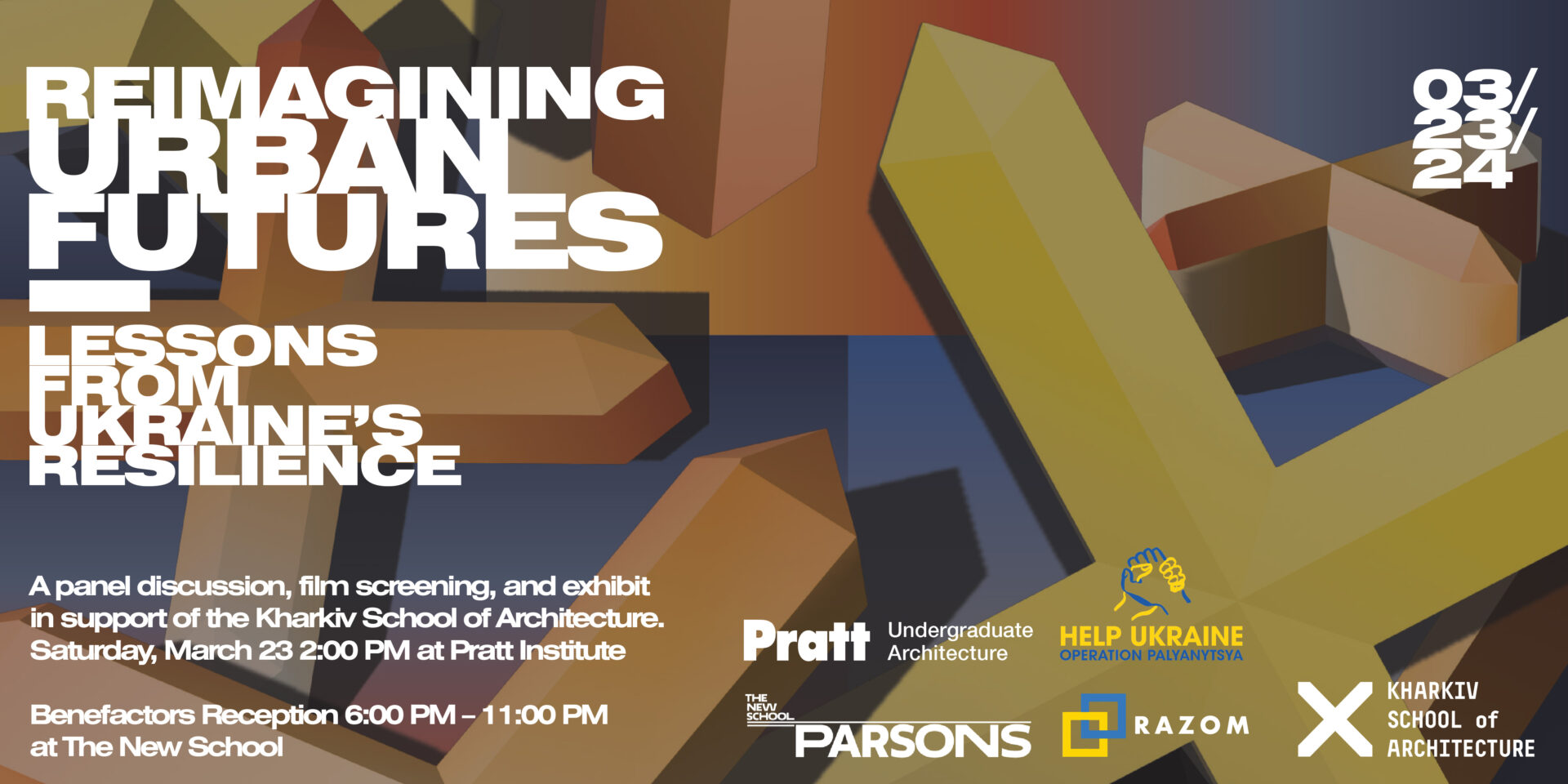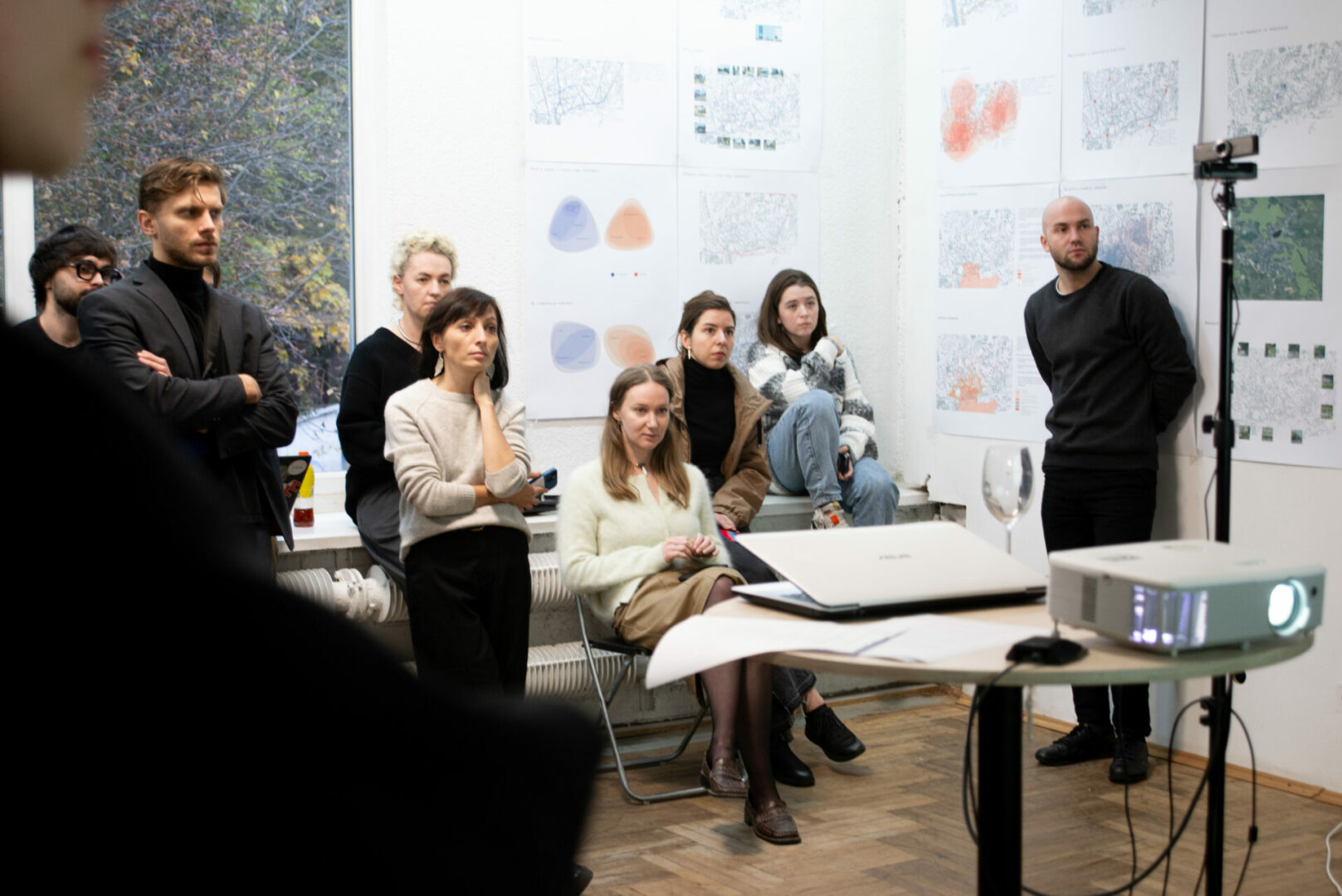In the wake of Russia’s invasion of Ukraine, cities and communities have faced unprecedented challenges, leading to a profound re-evaluation of urban priorities. This crucial moment in history not only highlights the devastating impacts of “urbicide” but also opens a discourse on the resilience and future prospects of urban landscapes under threat. In support of the Kharkiv School of Architecture (KhSA), this event aims to bring together architects, urban planners, designers, and thought leaders to explore the path forward in rebuilding and reimagining Ukrainian cities through education and capacity building.
Discussion Topics:
- The re-evaluation of urban priorities in Ukraine due to Russia’s Invasion.
- What has been lost; and future prospects around the question of “urbicide” in general.
- How the Kharkiv School of Architecture has shifted its curriculum to prepare young designers for the challenges of reconstruction.
- How Ukrainian designers are fighting to retain representation in decisions shaping the future of the built environment in Ukrainian cities.
- An exploration of sustainable approaches to planning, conservation, construction and reconstruction.
Panelists:
- (Moderator) Robert Mull, Director of Quality and Innovation, Publica, Architect, Former Director of Architecture and Dean of the Cass Faculty of Art
- Richard Plunz, Professor of Architecture, GSAPP, Founder & Director, Urban Design Lab
- Sasha Topolnytska, Adjunct Lecturer, Spitzer School of Architecture at City College of New York, Visiting Assistant Professor, Pratt Institute
- Brent Ryan, Professor of Urban Design and Public Policy, MIT,
- Vladimir Belogolovsky, Principal, Intercontinental Curatorial Project
- Eve Blau, Director, Davis Center for Russian and Eurasian Studies, Adjunct Professor, Harvard GSD
KhSA Speakers:
- Oleg Drozdov, Co-Founder and President of the KhSA, Studio Lecturer
- Iryna Matsevko, Deputy Vice-Chancellor, Professor, Heritage as Idea and Practice
- Ryan Locke, M.A. Program Director, Senior Lecturer
- KhSA Students
Event Sponsors:
Panelist Biographies:
Robert Mull is Publica’s Director of Quality and Innovation with responsibility for developing the team, building the practice’s professional and academic partnerships, establishing its international presence, and ensuring that the practice is at the forefront of the global conversation in terms of civic urbanism, critical thinking, research and design. Since joining Publica in 2016 Robert has been responsible for reviewing all Publica’s projects and ensuring that the practice’s work remains at the top of its field. An architect, educator and urbanist, Robert was educated at the Bartlett and the Architectural Association, and was until 2016, Director of Architecture and Dean of the Cass Faculty of Art, Architecture and Design in London. He has taught widely in the UK and internationally and held visiting professorships in Vienna, Innsbruck, Umeå and Izmir. Robert was a founder member of the architecture collective NATO and has worked on urban projects and research in many contexts including India, China, Cuba, Korea, the US, Russia, Ukraine and within the refugee crises in Turkey, Greece and France. Robert is Adjunct Professor of Architecture at the University of Limerick and teaches at Umeå University. Robert also leads the Global Free Unit, a transnational educational structure with academic, research, NGO and institutional partners focusing on live projects within areas of displacement and institutions including prisons, schools and communities. Robert is currently working with partners in Ukraine in support of the Kharkiv School of Architecture.
Richard Plunz is a Professor Emeritus of Architecture, Planning and Preservation at Columbia University, where he has served as Chair of the Division of Architecture and Director of the post-professional Urban Design Program. He was also an Earth Institute Professor and Founding Director of the Earth Institute’s Urban Design Lab. He is known for a wide range of urban research, development and design projects both nationally and internationally, with a particular expertise in urban infrastructure and housing fabric. He is the author of many articles, studies, and reports on urban development and ecology, including a revised edition of his pioneering study, A History of Housing in New York City (Columbia 1990) republished in 2016. His recent book is New York_Global. Critical Writings and Proposals, 1970-2020. In 2011, the Columbia Urban Design Program published Strategies for a Post-Soviet Kharkiv based on a joint design studio with the Kharkiv State Technical University of Construction and Architecture.
Sasha Topolnytska is a Ukrainian-born interdisciplinary designer and educator based in Brooklyn, NY. She has earned her Master of Architecture from the Taubman College of Architecture and Urban Planning at the University of Michigan, and she currently leads her independent practice and teaches at the Spitzer School of Architecture at the City College of New York. Her independent work is driven by a strong interest in the social and cultural values of architecture and design. She often collaborates with other creatives and social justice advocates to create designs that are inclusive and joyful for others. Sasha’s design work has been awarded NYCxDesign award and her collaborative projects have received support from the Center for Architecture, New York State Council on the Arts, and Design Trust for Public Space. Sasha is currently co-curating an exhibition called “Constructing Hope: Ukraine” that will open in May 2024 at the Center for Architecture in New York City. The exhibition will present the work of contemporary creatives who have been responding to immediate and long-term reconstruction needs in Ukraine.
Brent D. Ryan is Vice Provost and Professor of Urban Design and Public Policy in MIT’s Department of Urban Studies and Planning. His research focuses on the aesthetics and policies of contemporary urban design, particularly with respect to current and pressing issues like deindustrialization and climate change. Professor Ryan’s first book Design After Decline: How America Rebuilds Shrinking Cities, was selected by Planetizen as one of its ten best urban planning books of 2012, and his second book, The Largest Art, was published by MIT Press in 2017. Professor Ryan is the co-editor of the Journal of Planning History.
Vladimir Belogolovsky (b. 1970, Odesa, Ukraine) graduated from The Cooper Union School of Architecture in 1996. In 2008 he formed his New York City-based practice, Curatorial Project, a non-profit that focuses on curating and designing architectural exhibitions. He curated more than 60 exhibitions, including world tours of monographic shows on the works of Vector Architects, Harry Seidler (32 cities in 20 countries), Emilio Ambasz, and Colombian Architecture (10 American universities). His Architects’ Voices installations were presented in Australia, Argentina, China, India, Mexico, and the USA. Belogolovsky writes for The Architect’s Newspaper, Arquitectura Viva, AZURE, STIR, and World-Architects. He authored 20 books; among them: Imagine Buildings Floating Like Clouds, China Dialogues, Conversations with Architects, Soviet Modernism (1955-85), and architectural guides on New York and Chicago. He interviewed more than 500 leading architects, including 21 Pritzker Prize winners, and lectured at universities and museums in more than 30 countries.
KhSA Speaker Biographies:
Oleg Drozdov is co-founder and President of the Kharkiv School of Architecture. He is an architect, urbanist, artist, academic, European Commission and EU Mies van der Rohe Award expert. Since 1997, he is the founder and Chief Architect of Drozdov&Partners architectural office. Since 2020, he is a co-founder and the Chief Architect of the Paragraph studio of architecture and urbanism in Montreux, Switzerland. Since 2022, European Commission expert. He is also the co-founder of Ro3Kvit: urban coalition for Ukraine. Drozdov is positive that architects must develop their sense of place, culture, climate, and time. To this end, his whole team is engaged in international projects in France, Korea, Kuwait, Spain, Switzerland, the USA, and other countries, which expand their world view and provide a better understanding of themselves and their own culture.
Iryna Matsevko is the Deputy Vice-Chancellor of the Kharkiv School of Architecture. She defended a thesis on the ideology of Neo-Slavism and its reception in the intellectual and political circles of Galicia in the early 20th century. She taught the History of Central and Eastern Europe and Intellectual History at the Faculty of History, University of Lviv, until 2007. From 2008 to 2019, Iryna Matsevko was first an academic coordinator and then Deputy Director and Head of the Public History Programs at the Centre for Urban History in Lviv. She then became an independent researcher and manager of cultural projects focused on contested urban memories and current approaches to heritage. In April 2021, Iryna Matsevko joined the Kharkiv School of Architecture as Deputy Vice-Chancellor. In addition, as Humanities Block tutor, she designs courses on the cultural and social contexts of architecture, heritage studies and urban practices.
Ryan Locke is the director of the upcoming Master of Arts in Architecture and Urbanism at the Kharkiv School of Architecture. He is an urbanist, researcher, and international educator focused on the promotion of human-scale cities and public space design, use, and advocacy. He holds a Master degree in Urban Planning and Urban Design, and a Doctoral degree in Urban and Regional Studies from the School of Architecture and the Built Environment at KTH – The Royal Institute of Technology in Stockholm, Sweden. His doctoral research, “City Re-Making Approaches in Contemporary Urbanism” focused on processes of urban decline and revitalization, and the role of place-based strategies in the context of shrinking cities, with research carried out in Detroit, Chicago, Boston, New York and New Orleans. While at KTH, he was the co-founder and co-director of the international Master of Urbanism Studies program, where he taught the course Public Life Studies and Tools for Urban Analysis. He was a member of the research group ‘Urban Form and Human Behavior’ at the Center for the Future of Places (KTH).
We are training a new cohort of built environment professionals to lead Ukraine’s reconstruction, will you join us?
The Kharkiv School of Architecture is searching for funds to train a new cohort of built environment professionals specifically to address Ukraine’s current challenges for shelter and housing, and plan for its postwar reconstruction. Every donation – large or small – helps keep our doors open and our students in education. Every contribution makes a difference to us now – and paves the way for a bright future in Ukraine. YOU are crucial to help US build Ukraine’s future. Please follow the link to make a donation today
You can also see what your donation may change and what you will receive as a donor in the Donation Tiers
Donations are tax deductible to the extent allowable by law.




